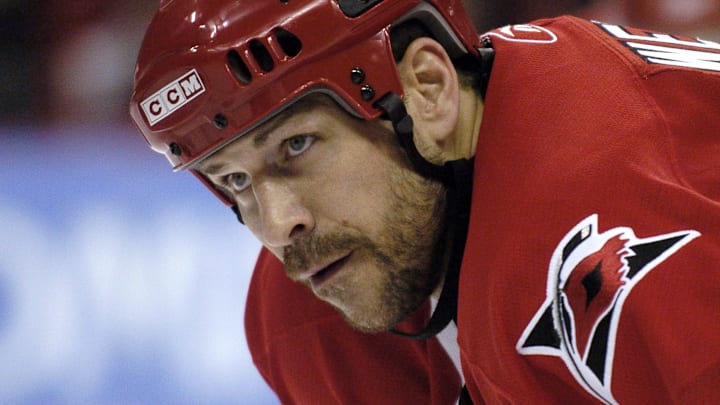During the final days of August, I want to tackle three of the biggest trades in franchise history, beginning with the two deals the Hurricanes made on the road to the Stanley Cup in 2006. The first of those veteran additions was Doug Weight, a forward deep into his career without ever making it to the pinnacle.
Selected in the 2nd round by the New York Rangers in 1990, Weight came into his own as a member of the Edmonton Oilers. Topping 80 points three times in nine seasons, including 104 points in 1995-96, and being named to three All-Star teams, Weight was shipped to the St. Louis Blues as the 2001 offseason began.
With the Blues, Weight was nearly a point-per-game player (181 points in 206 games) in the three seasons before the 2004 lockout, earning his 4th All-Star nod in 2003. Weight had played well for the Blues coming out of the pause as well, scoring 44 points in 47 games, but St. Louis was not very good, allowing the Hurricanes to swoop in and get some help up front.
Playoff hockey for Weight was hardly anything new. He'd played in the postseason 10 times, including each of the last eight years. In 2003, Weight recorded 13 points in a seven-game series loss to the Canucks, outscoring everyone else by six points. He'd been in the playoffs, but he'd never experienced any team success.
The Hurricanes gave up a lot, but also nothing
To get the deal done, the Hurricanes included six pieces, sending forwards Mike Zigomanis and Jesse Boulerice, the signing rights for forward Magnus Kahnberg, and three draft picks to the Blues. Along with Weight, the Canes acquired the signing rights for forward Erkki Rajamaki.
Neither Zigomanis nor Boulerice did anything for St. Louis. Boulerice was pointless in 12 appearances, while Zigomanis appeared twice. Both left through free agency after the season. Zigomanis had his best NHL season with Phoenix in 2006-07, while Boulerice didn't score another point at the NHL level. Kahnberg signed with St. Louis in 2006 but was back in Sweden the same year.
The Blues used the Canes' 1st-round pick (30th overall) to trade up five spots with the Devils. With the 25th pick, the Blues selected Patrik Berglund. He spent a decade with the Blues, scoring 168 goals and 322 points. Berglund was traded to the Sabres for Ryan O'Reilly in 2018. The Devils selected Matthew Corrente with the Canes' pick. Corrente only played 34 NHL games with New Jersey.
Neither 4th-round pick yielded much either. In 2006, the Blues selected goalie Reto Berra. He never played for St. Louis, being traded in 2013 for Jay Bouwmeester. Berra went on to play 76 games for four teams. In 2007, they selected Cade Fairchild, who only made five appearances for the Blues during the 2011-12 season, recording one assist.
The Hurricanes got nothing out of Rajamaki. After making a few appearances for the Blues' affiliates before the trade, he returned to Finland, where he'd remain for his career. He never suited up for the Canes or any of their minor league teams. Rajamaki became a scout for Pittsburgh and Boston once his playing career finished.
Weight had some big moments, though he wasn't on the ice for Game 7
It was a slow transition into the lineup for Weight. The 2006 Olympic break didn't do much to help that, though he represented the United States. The U.S. was knocked out in the quarterfinals by silver medalists, Finland. He recorded three assists in six games in Italy. Through his first 10 games with the Hurricanes, Weight managed just one assist.
Things started to click in mid-March. A two-assist outing snowballed into a two-goal, three-point effort a few games later. Suddenly, Weight was finding the scoresheet with regularity. By the end of the regular season, Weight finished with four goals and 13 points in 23 games. Between St. Louis and Carolina, he had 57 points in 70 games.
Where it would all matter was the playoffs. Through the first two rounds, Weight was putting up decent numbers. He had three assists in the conference quarterfinals against Montreal. Then, he scored a goal and three assists to beat the Devils in five games in the conference semifinals. For the first time in his career, Weight was playing in the conference finals.
He stepped up to the plate in a big way, but he made a costly mistake in Game 6. With the Canes needing just one goal to vanquish the Sabres for good in overtime, Weight took an ill-advised boarding penalty early in extra time. Daniel Briere scored to extend the series. How did Weight respond? By scoring the game-tying goal in Game 7 and adding an assist to beat Buffalo.
Weight found the scoresheet in the first two games of the 2006 Stanley Cup Final against his former team. In Game 5, Weight exited with a shoulder injury after being sandwiched by two Oilers. This forced him out for the final two games. It wouldn't keep him off the ice for the Cup presentation. Weight was the sixth player to hoist it, though he couldn't raise his right shoulder very high.
After the season, Weight returned to St. Louis before being traded again, this time to the Ducks. He played three seasons on Long Island, becoming their captain, and retired to join their coaching staff. He retired with 1,033 points in 1,238 games. Weight had a brief stint as the head coach of the Islanders, spending a season and a half as their bench boss.
His performance in Game 7 of the Eastern Conference Finals was enough to justify this trade as a success, but the overall return doing nothing for St. Louis was the icing on the cake. It was great to see a veteran, like Doug Weight, get his moment in the sun, even if he couldn't be on the ice for the game that sealed the deal.
